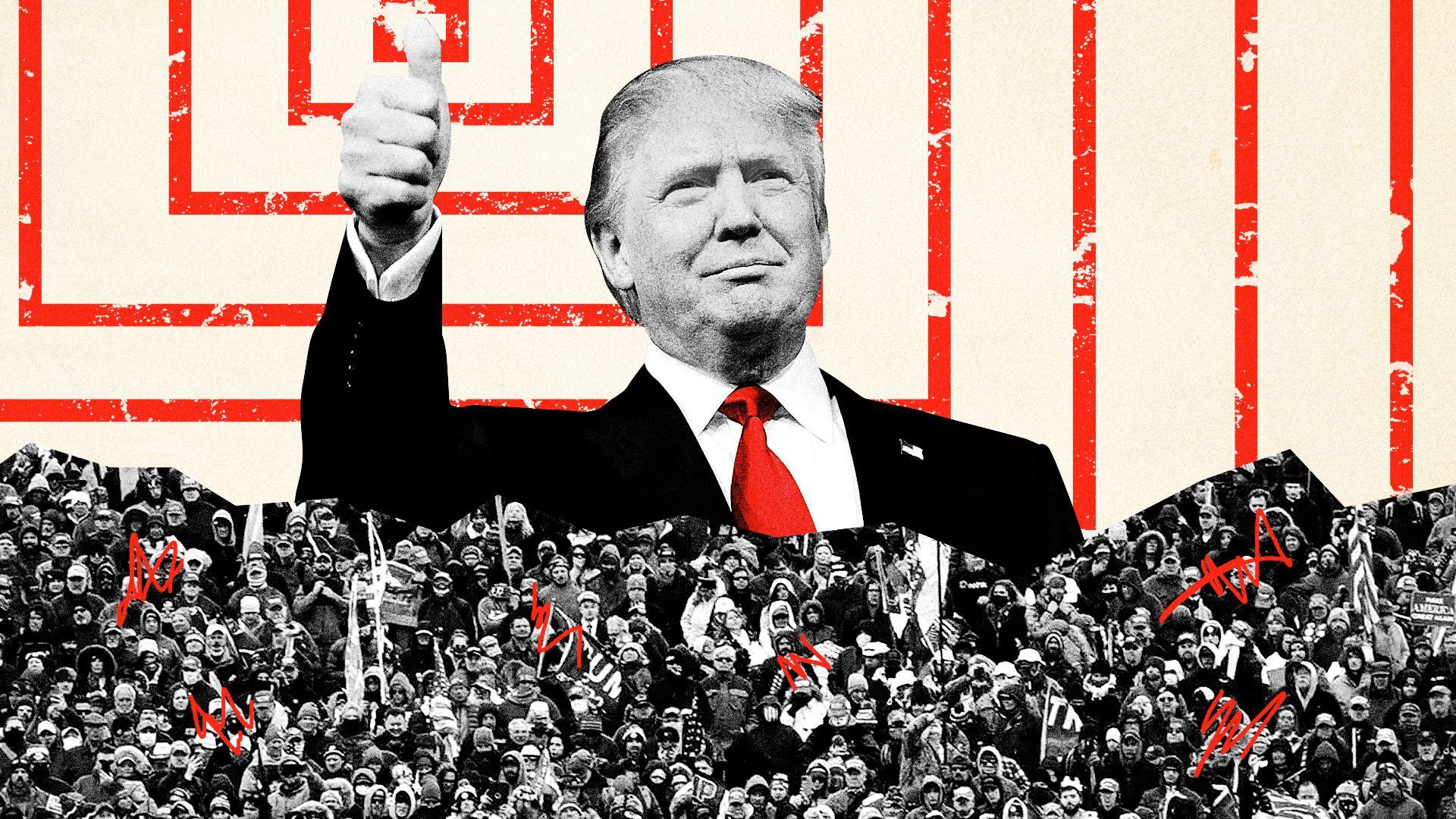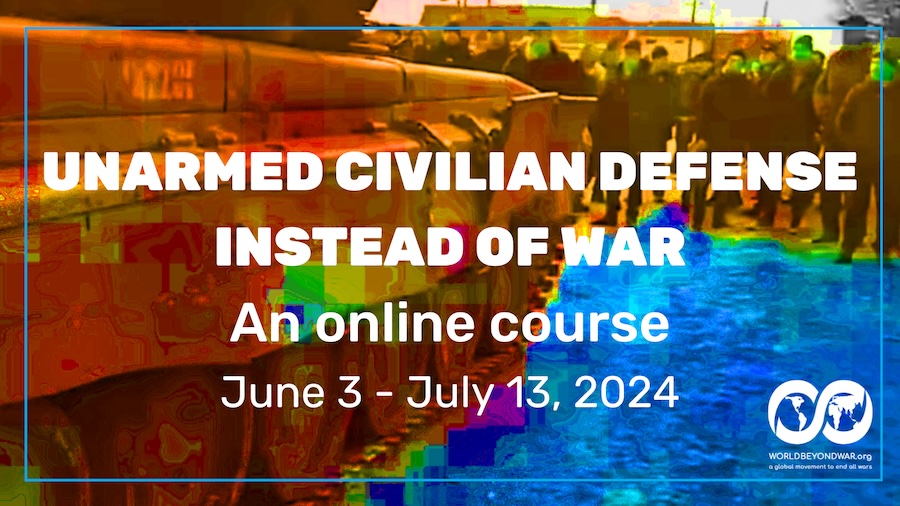
Deep State Does Stop-Trump Games
With One Hand Tied Behind Back
David Swanson / World BEYOND War
(July 30, 2024) — According to The Guardian on Tuesday, “Washington insiders role-played a second Trump presidency. Can it save democracy?” I’m pretty sure the “it” in that headline is “Washington insiders.” Apparently it is a bipartisan group of them, all serious, responsible adults who recently ran through five “war games” to determine whether and how they would defend so-called “democracy” from Trump.
In one, Trump calls out the military to prevent nonviolent protests. “A second game looked at Trump’s threat to politicize federal agencies, including the justice department, and weaponize them against his political enemies. A third probed his immigration plans, which include dark warnings of mass roundups of undocumented immigrants and large-scale deportations.”
While a wealth of wisdom and numerous stories of success exist on resisting such scenarios around the world for many years, it’s not clear that these US-centric officials, so used to viewing activists as enemies (or denouncing them as “outside agitators” when they advise students), consulted any of it. Instead, they found themselves at a general loss as to how to resist.
“‘This wasn’t a fanciful or unrealistic scenario,’ said Peter Keisler, former acting US attorney general under George W Bush, who participated in the simulation. ‘We know people associated with Trump have been looking into how to use the Insurrection Act to deploy military force domestically against protests.’
“Keisler said that taking part in the exercise brought home to him how hard it would be to stop such a move: ‘It confirmed for me that for an authoritarian-minded president, deploying the military domestically could be one of the easiest and fastest levers of power that could be pulled, given how vaguely written the statute is.’
“In the course of the Insurrection Act tabletop exercise, the person role-playing Trump initially met resistance from senior military figures who tried to cling to the Posse Comitatus Act barring federal troops from engaging in civilian law enforcement. As the scenario unfolded, Trump grew impatient and ended up firing the joint chiefs of staff, replacing them with military officers who would do his bidding and federalise the national guard.
“The way the exercise played out jibed with the fears of another of its participants, Paul Eaton, a former major general in the US army. ‘I’m not sure we can count on the military in a Trump world,’ he said.”

Nonviolent Action Versus Martial Law
No serious strategy would rely on citing the proper law or counting on the military. Yet those are the only ideas mentioned. Later, in response to one of the other imagined crises, we find a mention of “civil disobedience”:
“In response, the blue oppositional team called congressional hearings, tried to mobilize people across the country to protest the president’s actions, staged acts of civil disobedience, and threatened lawsuits. At the end of the simulation, the consensus among many policy experts was that the blue team’s response felt weak and inadequate, with little agreement over message. ‘Blue has a catch-22 because they’re forces of normality, but all of this is not normal,’ one participant said.”
Of course, a serious strategy involves huge numbers of people, numbers along the lines of what the “blue team” helped to mobilize in 2002-2006 by partially pretending to oppose the war on Iraq, before gaining power and escalating it. What is needed may not be easily imaginable to people in the habit of feinting in the direction of popular demands and then moving in the direction of the same corporate, militarist agenda they supposedly “oppose.” In fact, this team seems to have come up empty:
“As the Brennan Center has highlighted in its initial findings from the war-games, participants came away from the simulations sobered by the experience. Above all, they discovered that there were far fewer effective restraints at their disposal than they had expected. Asked to identify the biggest lesson she had learned, [Christine Todd] Whitman said: ‘How little there is we can do.’”

Nonviolent Activism Has Thwarted Coups Worldwide
And yet, weeks ago, people in Bolivia turned out and prevented a coup. There is no mention of it here. Even less will there be studies of the successful support of anti-Western coups.
Last year in Niger, a military coup took power and told France to remove its military (1500+ troops). France refused to recognize the new leader or remove troops. Instead, France tried to involve ECOWAS (African NATO) to put down the military coup. Other nations, like Nigeria, were initially aggressive toward the military coup, but demonstrations in their countries pulled them back from that stance. Mass protests at the main French military base led to France pulling its troops out. A western-backed military intervention was thwarted.
In recent years in Canada, indigenous people have used nonviolent action to prevent the armed installation of pipelines on their lands by the Canadian military — what are the chances their work will be studied by super-serious US think tanks?
In 2018, Armenians protest successfully for the resignation of Prime Minister Serzh Sargsyan — a human the same as Donald Trump, perfectly removable by popular nonviolent action.
In 2015, Guatemalans compelled a corrupt president to resign. In 2014-2015, in Burkina Faso, people nonviolently prevented a coup. (See the account in Part 1 of “Civil Resistance Against Coups” by Stephen Zunes, and tell your Congress Member to study it.)
In 2011, Egyptians brought down the US-backed dictatorship of Hosni Mubarak, after Tunisians overthrew a dictator and inspired half the world to action. How much study is that being given?
The same year, Yemenis ousted the Saleh regime and Maldivians successfully demanded the resignation of their president. I’m just scratching the surface. The examples are many.
They require studying effective ways to resist governments, something governments are loath to teach, study, or even think about. They require studying the successes of unarmed civilian defense — something military machines dressed up as governments have little toleration for.

Unarmed Civilian Defense
Usually nations do not want their populations capable of repelling foreign invasions because the same skills would make them able to resist domestic injustice. Democrats who would clearly prefer Trump to Bernie Sanders might prefer him even more to a public capable of having its way, also known as self-governing. But we should not pretend that lunatics with nuclear buttons cannot be resisted, that the tools do not exist, that it has not been done a hundred times before.
This is not just the little tragicomedy of the United States pretending that universal healthcare is impossible while struggling not to notice every other wealthy nation on Earth doing it. This is choosing dictatorship over actual democracy in the name of a so-called “democracy” so weak that it cannot even think of empowering people or notice what 96% of the people on Earth have been up to.
Comment
Donald S — One difficulty with launching a successful peaceful uprising in the US is that MAGA Republicans seem more eager to do so than do Democrats and than do antiwar progressives. Furthermore, MAGA are anti-woke, more than anti-government, and MAGA seem more willing to be violent.
In Bolivia, Niger, Armenia, Guatemala, etc., a large number of the citizens were opposed to the government. Here there are two divisions: between the People and the Government, and between progressives and conservatives. A protest movement to stop Trump would bump up against the MAGA movement, who are as angry and more armed. It would be hard to pry off and distinguish antiwar protests from the anti-Trump and anti-Woke protests. There might end up being a civil war.
A second difficulty is that the militarized government and police are very prepared and willing to squash grassroots opposition movements, such as they did with:
- the protests against the second war in Iraq,
- Occupy Wall Street
- The protests against police violence
- The pro-Palestinian protests
In the 1960s, the antiwar and civil rights movements made some progress, despite violent and nasty opposition, including infiltration and disruption by the police and FBI. I think that now the government is more organized, better funded, and several steps ahead of opposition movements. When someone such as Chris Hedges says we need massive nonviolent civil disobedience, led by the workers, I think it’s a pipe dream, since many workers are MAGA or are pro-military and hyper-patriotic.